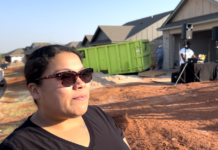
By Tim Farley, News Editor – Korean War veteran Bob Graves wouldn’t change anything about his military service, including the year he spent operating as a military policeman along the 38th Parallel in South Korea.
Fortunately, he never saw combat but his eyewitness accounts of other action forced him, like so many other vets, to refrain from talking about his experiences for many years. Now 85, Graves, a Yukon resident, opened up during an interview with the Yukon Progress as Veterans Day approached.
Graves was in country about a year and for the most part, his job was to keep the roads clear for U.S. and South Korean military traffic.
Yet, there were times when Graves witnessed wartime events that he wishes he could forget.
For instance, Graves recalled one night when a jeep occupied by three men pulled off the road about 100 yards west of the checkpoint. One man carried a roll of wire as the trio disappeared into some brush. Seconds later, Graves heard a loud boom and saw three heads rolling down the hill.
“They had hit ‘em with a wire and blew them up,” he recalled.
Graves also wasn’t fond of the way South Korean military police treated South Korean citizens who had been displaced by the war.
“There were two American MPs and two South Korean MPs together in a jeep and the South Korean citizens would travel during the day trying to find shelter, anything that would keep them warm at night. They were also looking for family members, but the South Korean police were not gentle. They would grab the family members and throw them into the ditch. I felt really bad the way they were treated, but there was nothing we could do. We couldn’t touch them. We could control our guys, but that was it.”
Yet, not all of Graves’ experiences were filled with sadness and tragedy.
He recalled one day when American film and television actress Terry Moore and her entourage were forced to wait like all other traffic because of a wreck on a bridge.
“It was a six-vehicle USO group coming down the road and they had to stop. We were getting chewed out because they had to stop and couldn’t continue on. I remember she (Moore) wanted us to hurry up so they could get on their way, but they had to stop like everybody else,” he said.
Graves was in country from September 1951 until October 1952, which allowed him to experience the harsh winters of South Korea.
“It was raw,” he said. “It was very cold, sometimes 40-below. I remember we had 12-man tents with two stoves and we could put our Army cots six inches from the stove. I had never experienced anything like it.”
Whether working as a MP during the day or night, the winters were cold.
“We had 12-hour shifts and you were basically by yourself,” Graves recalled. “During the day, we would keep the roads cleared and everything that was loaded had preference. At night, we go to the mountain tops and control the traffic up there.”
Graves’ military career actually involved three branches – the National Guard, Army and later the U.S. Air Force.
Graves and other discharged Army soldiers took a slow boat from Korea back to the U.S. in 1952. During the trip, Graves recalled stopping in Nagasaki, Japan, where the U.S. had dropped an atomic bomb years earlier. Graves said seeing the city and the damage that still existed at that time was sobering.
After being discharged from the Army in 1952, Graves joined the Air Force about a year later. He stayed there for about three years before leaving the military for civilian life. At that point, Graves joined the U.S. Postal Service where he worked for 30 years.
“Being in the military and particularly Korea is an experience you’ll never forget. It teaches you about life,” he said. “I’m glad I served.”





